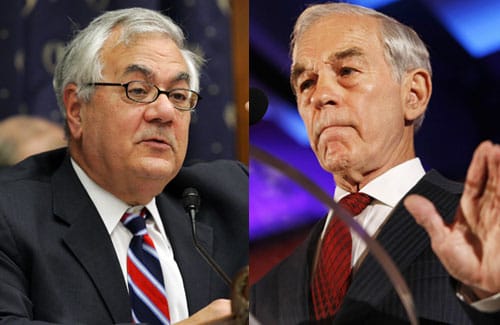In bipartisan operation, Barney Frank and Ron Paul look to tackle record military budgets


Liberal Democrat Barney Frank and Libertarian-leaning Republican Ron Paul are uniting to take on a budget behemoth: military spending. According to a Huffington Post article, which cited Frank's recently sanctioned bipartisan commission report, the Department of Defense currently takes up about 56% of federal discretionary spending, with lawmakers pointing out that 65% of the increase in discretionary spending since 2001 has been military-related.
This significant increase in military spending, as well as a commensurate increase in domestic-related spending, has come at a time when DC has proven incapable of balancing the federal budget in the last ten years. As a result, the national debt has risen by approximately $8 trillion during the Bush-Obama years.
It should also be noted that record military budgets are not exclusive to either party. Under Bush and a largely Republican Congress, military spending exploded due to the Afghanistan and Iraq wars, and new government security agencies. Under Obama and a Democratic Congress, the military budget has grown even bigger.
For Paul, Frank, and a few other cosigners (at this time), the military budget can no longer be considered a sacred cow. As a result, they have proposed cutting spending by $1 trillion over the next decade, amounting to $100 billion a year, which would represent anywhere from a 10% to 13% annual reduction depending on the budget numbers being assessed.
To put these figures into a global context, as of 2009, the United States accounted for nearly 47% of the entire world's military spending. The next ten countries comprise about 21% of the worldwide total, with emerging superpower China weighing in about 7%.
Frank's and Paul's proposed cuts specifically target U.S. military bases in Western Europe and Japan, where these relatively affluent nations possess more than ample resources to provide for their own security. They also made it clear that cuts would not affect resources and supplies for troops currently in combat, as well as veterans' services.
With America mired in $13 trillion of debt, this bipartisan proposal would appear to be a step in the right direction. Now, if only similar spending cut proposals would target other bloated budget programs as well, both foreign and domestic.


